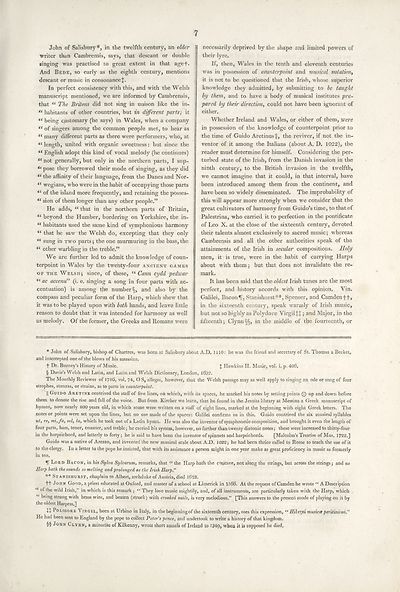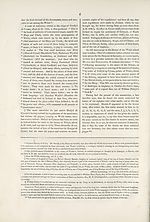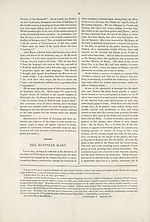Glen Collection of printed music > Printed music > General collection of the ancient music of Ireland
(23) Page 7
Download files
Complete book:
Individual page:
Thumbnail gallery: Grid view | List view

7
John of Salisbury*, in the twelfth century, an older
writer than Cambrensis, says, that descant or double
singing was practised to great extent in that agef.
And Bede, so early as the eighth century, mentions
descant or music in consonance^.
In perfect consistency with this, and with the Welsh
manuscript mentioned, we are informed by Cambrensis,
that “ The Brito?is did not sing in unison like the in-
“ habitants of other countries, but in different parts; it
“ being customary (he says) in Wales, when a company
<c
of singers among the common people met, to hear as
t(
many different parts as there were performers, who, at
length, united w
r
ith organic sweetness: but since the
English adopt this kind of vocal melody (he continues)
u
not generally, but only in the northern parts, I sup-
tl
pose they borrowed their mode of singing, as they did
“ the affinity of their language, from the Danes and Nor-
“ wegians, who were in the habit of occupying those parts
<l
of the island more frequently, and retaining the posses-
<c
sion of them longer than any other people.”
He adds, “ that in the northern parts of Britain,
“ beyond the Humber, bordering on Yorkshire, the in-
<c
habitants used the same kind of symphonious harmony
*
(
that he saw the Welsh do, excepting that they only
“ sung in two parts; the one murmuring in the bass, the
“ other warbling in the treble.”
We are further led to admit the knowledge of coun¬
terpoint in Wales by the twenty-four ancient games
of the Welsh; since, of these, “ Cann cydd pedwar
“ ac acceniC (i. e. singing a song in four parts with ac¬
centuation) is among the number^, and also by the
compass and peculiar form of the Harp, which shew that
it was to be played upon with both hands, and leave little
reason to doubt that it was intended for harmony as well
as melody. Of the former, the Greeks and Romans were
necessarily deprived by the shape and limited powers of
their lyre.
If, then, Wales in the tenth and eleventh centuries
was in possession of counterpoint and musical notation^
it is not to be questioned that the Irish, whose superior
knowledge they admitted, by submitting to be taught
by them, and to have a body of musical institutes pre¬
pared by their direction, could not have been ignorant of
either.
Whether Ireland and Wales, or either of them, were
in possession of the knowledge of counterpoint prior to
the time of Guido Aretinus||, the reviver, if not the in¬
ventor of it among the Italians (about A. D. 1022), the
reader must determine for himself. Considering the per¬
turbed state of the Irish, from the Danish invasion in the
ninth century, to the British invasion in the twelfth,
we cannot imagine that it could, in that interval, have
been introduced among them from the continent, and
have been so widely disseminated. The improbability of
this will appear more strongly when we consider that the
great cultivators of harmony from Guido’s time, to that of
Palestrina, who carried it to perfection in the pontificate
of Leo X. at the close of the sixteenth century, devoted
their talents almost exclusively to sacred music; whereas
Cambrensis and all the other authorities speak of the
attainments of the Irish in secular compositions. Holy
men, it is true, were in the habit of carrying Harps
about with them; but that does not invalidate the re¬
mark.
It has been said that the oldest Irish tunes are the most
perfect, and history accords with this opinion. Yin.
Galilei, Bacon % Stanishurst**, Spenser, and Camden ff,
in the sixteenth century, speak warmly of Irish music,
but not so highly as Polydore Virgil ; and Major, in the
fifteenth; Clynn§§, in the middle of the fourteenth, or
* John of Salisbury, bishop of Chartres, was born at Salisbury about A.D. 1110: he was the friend and secretary of St. Thomas a Becket,
and intercepted one of the blows of his assassins.
f Dr. Burney’s History of Music. J Hawkins H. Music, vol. i. p. 406.
§ Davis’s Welsh and Latin, and Latin and Welsh Dictionary, London, 1632.
The Monthly Reviewer of 1786, vol. 74, O S, alleges, however, that the Welsh passage may as well apply to singing an ode or song of four
strophes, stanzas, or strains, as to parts in counterpoint.
|| Guido Aretine contrived the staff of five lines, on which, with its spaces, he marked his notes by setting points © up and down before
them to denote the rise and fall of the voice. But from Kircher we learn, that he found in the Jesuits library at Messina a Greek manuscript of
hymns, now nearly 800 years old, in which some were written on a staff of eight lines, marked at the beginning with eight Greek letters. The
notes or points were set upon the lines, but no use made of the spaces: Galilei confirms us in this. Guido contrived the six musical syllables
at, re, mi, fa, sol, la, which he took out of a Latin hymn. He was also the inventor of symphonetic composition, and brought it even the length of
four parts, bass, tenor, counter, and treble; he carried his system, however, no farther than twenty diatonic notes; these were increased to thirty-four
in the harpsichord, and latterly to forty ; he is said to have been the inventor of spinnets and harpsichords. [Malcolm’s Treatise of Mus. 1722.]
Guido was a native of Arezzo, and invented the new musical scale about A.D. 1022; he had been thrice called to Rome to teach the use of it
to the clergy. In a letter to the pope he insisted, that with its assistance a person might in one year make as great proficiency in music as formerly
in ten.
IT Lord Bacon, in his Sylva Sylvarum, remarks, that “ the Harp hath the concave, not along the strings, but across the strings; and no
Harp hath the sounds so melting and prolonged as the Irish Harp."
** Stanishurst, chaplain to Albert, archduke of Austria, died 1618.
ft John Good, a priest educated at Oxford, and master of a school at Limerick in 1566. At the request of Camden he wrote “ A Description
<c
of the wild Irish,” in which is this remark ; “ They love music mightily, and, of all instruments, are particularly taken with the Harp, which
“ being strung with brass wire, and beaten (struck) with crooked nails, is very melodious.” [This answers to the present mode of playing on it by
the oldest Harpers.]
It Polidore Virgil, born at Urbino in Italy, in the beginning of the sixteenth century, uses this expression, “ Hilerni musket peritissmi.”
He had been sent to England by the pope to collect Peter's pence, and undertook to write a history of that kingdom.
§§ John Clynn, a minorite of Kilkenny, wrote short annals of Ireland to 1349, when it is supposed he died.
John of Salisbury*, in the twelfth century, an older
writer than Cambrensis, says, that descant or double
singing was practised to great extent in that agef.
And Bede, so early as the eighth century, mentions
descant or music in consonance^.
In perfect consistency with this, and with the Welsh
manuscript mentioned, we are informed by Cambrensis,
that “ The Brito?is did not sing in unison like the in-
“ habitants of other countries, but in different parts; it
“ being customary (he says) in Wales, when a company
<c
of singers among the common people met, to hear as
t(
many different parts as there were performers, who, at
length, united w
r
ith organic sweetness: but since the
English adopt this kind of vocal melody (he continues)
u
not generally, but only in the northern parts, I sup-
tl
pose they borrowed their mode of singing, as they did
“ the affinity of their language, from the Danes and Nor-
“ wegians, who were in the habit of occupying those parts
<l
of the island more frequently, and retaining the posses-
<c
sion of them longer than any other people.”
He adds, “ that in the northern parts of Britain,
“ beyond the Humber, bordering on Yorkshire, the in-
<c
habitants used the same kind of symphonious harmony
*
(
that he saw the Welsh do, excepting that they only
“ sung in two parts; the one murmuring in the bass, the
“ other warbling in the treble.”
We are further led to admit the knowledge of coun¬
terpoint in Wales by the twenty-four ancient games
of the Welsh; since, of these, “ Cann cydd pedwar
“ ac acceniC (i. e. singing a song in four parts with ac¬
centuation) is among the number^, and also by the
compass and peculiar form of the Harp, which shew that
it was to be played upon with both hands, and leave little
reason to doubt that it was intended for harmony as well
as melody. Of the former, the Greeks and Romans were
necessarily deprived by the shape and limited powers of
their lyre.
If, then, Wales in the tenth and eleventh centuries
was in possession of counterpoint and musical notation^
it is not to be questioned that the Irish, whose superior
knowledge they admitted, by submitting to be taught
by them, and to have a body of musical institutes pre¬
pared by their direction, could not have been ignorant of
either.
Whether Ireland and Wales, or either of them, were
in possession of the knowledge of counterpoint prior to
the time of Guido Aretinus||, the reviver, if not the in¬
ventor of it among the Italians (about A. D. 1022), the
reader must determine for himself. Considering the per¬
turbed state of the Irish, from the Danish invasion in the
ninth century, to the British invasion in the twelfth,
we cannot imagine that it could, in that interval, have
been introduced among them from the continent, and
have been so widely disseminated. The improbability of
this will appear more strongly when we consider that the
great cultivators of harmony from Guido’s time, to that of
Palestrina, who carried it to perfection in the pontificate
of Leo X. at the close of the sixteenth century, devoted
their talents almost exclusively to sacred music; whereas
Cambrensis and all the other authorities speak of the
attainments of the Irish in secular compositions. Holy
men, it is true, were in the habit of carrying Harps
about with them; but that does not invalidate the re¬
mark.
It has been said that the oldest Irish tunes are the most
perfect, and history accords with this opinion. Yin.
Galilei, Bacon % Stanishurst**, Spenser, and Camden ff,
in the sixteenth century, speak warmly of Irish music,
but not so highly as Polydore Virgil ; and Major, in the
fifteenth; Clynn§§, in the middle of the fourteenth, or
* John of Salisbury, bishop of Chartres, was born at Salisbury about A.D. 1110: he was the friend and secretary of St. Thomas a Becket,
and intercepted one of the blows of his assassins.
f Dr. Burney’s History of Music. J Hawkins H. Music, vol. i. p. 406.
§ Davis’s Welsh and Latin, and Latin and Welsh Dictionary, London, 1632.
The Monthly Reviewer of 1786, vol. 74, O S, alleges, however, that the Welsh passage may as well apply to singing an ode or song of four
strophes, stanzas, or strains, as to parts in counterpoint.
|| Guido Aretine contrived the staff of five lines, on which, with its spaces, he marked his notes by setting points © up and down before
them to denote the rise and fall of the voice. But from Kircher we learn, that he found in the Jesuits library at Messina a Greek manuscript of
hymns, now nearly 800 years old, in which some were written on a staff of eight lines, marked at the beginning with eight Greek letters. The
notes or points were set upon the lines, but no use made of the spaces: Galilei confirms us in this. Guido contrived the six musical syllables
at, re, mi, fa, sol, la, which he took out of a Latin hymn. He was also the inventor of symphonetic composition, and brought it even the length of
four parts, bass, tenor, counter, and treble; he carried his system, however, no farther than twenty diatonic notes; these were increased to thirty-four
in the harpsichord, and latterly to forty ; he is said to have been the inventor of spinnets and harpsichords. [Malcolm’s Treatise of Mus. 1722.]
Guido was a native of Arezzo, and invented the new musical scale about A.D. 1022; he had been thrice called to Rome to teach the use of it
to the clergy. In a letter to the pope he insisted, that with its assistance a person might in one year make as great proficiency in music as formerly
in ten.
IT Lord Bacon, in his Sylva Sylvarum, remarks, that “ the Harp hath the concave, not along the strings, but across the strings; and no
Harp hath the sounds so melting and prolonged as the Irish Harp."
** Stanishurst, chaplain to Albert, archduke of Austria, died 1618.
ft John Good, a priest educated at Oxford, and master of a school at Limerick in 1566. At the request of Camden he wrote “ A Description
<c
of the wild Irish,” in which is this remark ; “ They love music mightily, and, of all instruments, are particularly taken with the Harp, which
“ being strung with brass wire, and beaten (struck) with crooked nails, is very melodious.” [This answers to the present mode of playing on it by
the oldest Harpers.]
It Polidore Virgil, born at Urbino in Italy, in the beginning of the sixteenth century, uses this expression, “ Hilerni musket peritissmi.”
He had been sent to England by the pope to collect Peter's pence, and undertook to write a history of that kingdom.
§§ John Clynn, a minorite of Kilkenny, wrote short annals of Ireland to 1349, when it is supposed he died.
Set display mode to: Large image | Zoom image | Transcription
Images and transcriptions on this page, including medium image downloads, may be used under the Creative Commons Attribution 4.0 International Licence unless otherwise stated. ![]()
| Special collections of printed music > Glen Collection of printed music > Printed music > General collection of the ancient music of Ireland > (23) Page 7 |
|---|
| Permanent URL | https://digital.nls.uk/105833846 |
|---|
| Description | Scottish songs and music of the 18th and early 19th centuries, including music for the Highland bagpipe. These are selected items from the collection of John Glen (1833 to 1904). Also includes a few manuscripts, some treatises, and other books on the subject. |
|---|
| Description | The Glen Collection and the Inglis Collection represent mainly 18th and 19th century Scottish music, including Scottish songs. The collections of Berlioz and Verdi collected by bibliographer Cecil Hopkinson contain contemporary and later editions of the works of the two composers Berlioz and Verdi. |
|---|

